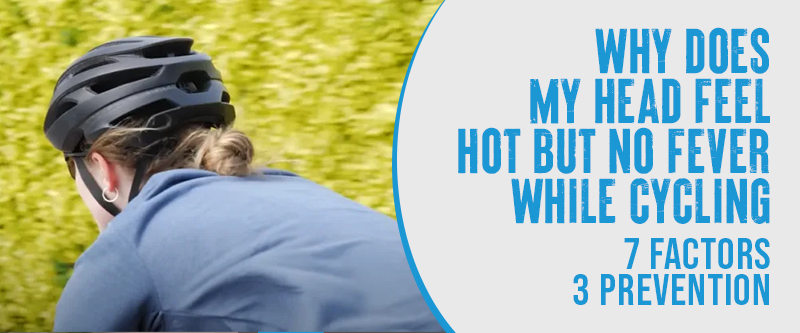A hot feeling in the head may be caused by hormonal fluctuations, thyroid problems, or heat-related disorders such as heat exhaustion. If accompanied by other symptoms, seek medical attention.
The rapid loss of heat from the body may cause your head to feel hot while cycling, causing muscle contractions that cause chills. This response can create a feverish feeling despite no actual rise in body temperature during exercise.
In this blog post, we will examine what factors contribute to feeling hot on the head without a fever while cycling and some prevention and treatment strategies to minimize excessive heat on the head while cycling.
Why Does My Head Feel Hot But No Fever While Cycling: 7 Causes
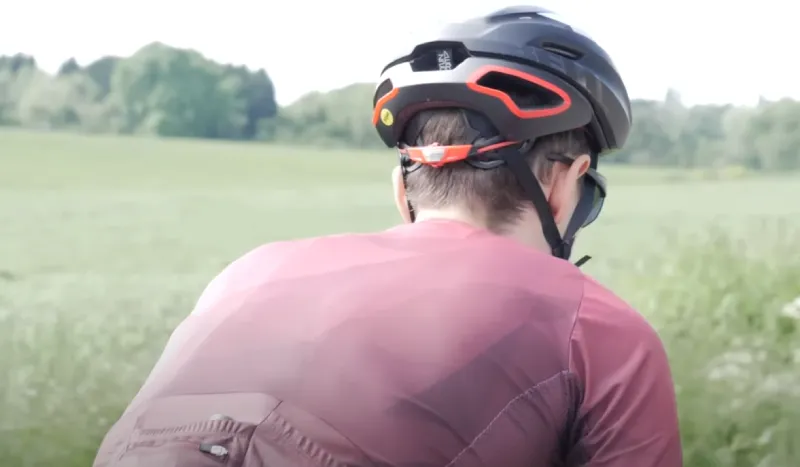
Cycling enthusiasts may often experience the discomfort of head overheating while riding, even when in good health. Delving into these factors can empower cyclists to regulate their body temperature and relish their rides effectively. Here are some key factors that may induce a sensation of heat without an actual fever.
Environmental and Lifestyle Factors
You can enjoy cycling while staying healthy. But sometimes, even without a fever, your head may feel hot. This can be because of several environmental and lifestyle factors. Let’s examine two main reasons: heat and humidity and intense physical activity.
Heat and Humidity
When cycling in hot and humid weather, your body works hard to cool itself down. Here’s how:
- High Temperatures: When the weather is hot, your body absorbs more heat from the environment.
- Humidity Levels: High humidity means more moisture in the air, making it harder for your sweat to evaporate and cool you down.
- Sweating: Your body sweats to cool off. But sweat doesn’t evaporate well when it’s humid, so you might feel hotter.
Intense Physical Activity
Cycling is great exercise but can also increase your body temperature. Here’s why:
- Vigorous Exercise: When you cycle hard, your muscles produce more heat. This is a natural part of working out.
- Body Heat Regulation: Your body, including the head, tries to balance this extra heat by sweating. Sometimes, this process needs to be faster, making you feel hot.
Dehydration
One common reason your head might feel hot while cycling is dehydration. When you don’t have enough fluids, it can make you feel even hotter. Let’s look at how dehydration affects you.
How Dehydration Makes You Feel Hotter
The body dehydrates when it loses more fluid than it takes in. This can happen quickly when you’re cycling. Here are some ways dehydration can make you feel hotter:
- Reduced Sweat Production: When dehydrated, the body can’t produce enough sweat to cool down. Sweat helps cool the body by evaporating from the skin.
- Thicker Blood: Dehydration makes your blood thicker, making it harder for your heart to pump it around your body. This makes it tougher for your body to get rid of excess heat.
- Impaired Temperature Regulation: Without enough fluids, your body struggles to regulate its temperature effectively, causing you to overheat more easily.
Signs of Dehydration
Knowing the signs of dehydration is crucial so you can address it quickly. Look out for these symptoms:
- Dry Mouth: Dry mouth or thirstiness is an early sign.
- Dark Urine: If your urine is dark yellow, it’s a sign you need more fluids.
- Dizziness: Feeling lightheaded or dizzy can indicate dehydration.
- Fatigue: If you feel exhausted, you might be dehydrated.
Age and Hormones
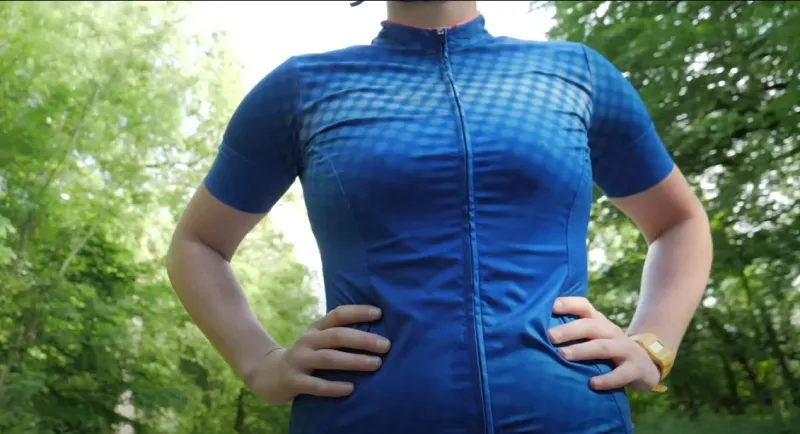
Feeling hot while cycling may also be related to your age and hormones. Let’s break down how these factors can affect your body temperature.
Hormonal Changes
Hormones play a big role in how your body regulates temperature. Here’s how:
- Menopause: Many women experience hot sweats as they undergo menopause. This means their body suddenly feels boiling.
- Hormonal Fluctuations: Other hormonal changes, such as those during puberty or pregnancy, can also raise body temperature.
Age
Your age can impact how well your body handles heat. Let’s see why:
- Children and Teens: Younger people have better thermoregulation. Their bodies can adjust to temperature changes more quickly.
- Older Adults: As people age, their bodies may need to cool down more efficiently. This can make them feel hotter during activities like cycling.
Medications
Sometimes, the medications you take can make your head feel hot while you’re cycling. Certain drugs have side effects that raise your body temperature. Let’s explore how this happens.
Effects of Medications
Medications can affect how your body controls its temperature. Here are some ways this can happen:
- Prescription Drugs: Some prescription medications, like those for high blood pressure or depression, can cause your body to heat up.
- Over-the-counter medications: Even common drugs like antihistamines and decongestants can make you feel warmer because they can interfere with sweat production.
- Stimulants: Medications that contain stimulants, such as those for attention deficit hyperactivity disorder (ADHD), can increase your heart rate and body temperature.
Hyperthermia
Feeling extremely hot in the head while cycling, even without a fever, can sometimes be due to hyperthermia. A person with hyperthermia has a high body temperature because it can’t cool down properly. Let’s understand hyperthermia and its symptoms.
Definition of Hyperthermia
Hyperthermia occurs when your body absorbs more heat than it can get rid of. This can happen during intense physical activities like cycling, especially in hot weather. Here’s how it works:
- Heat Build-Up: Your body generates heat when you exercise. If the weather is also hot, this adds extra heat.
- Cooling Problems: Normally, your body cools itself through sweat, which increases blood flow to your skin. In hyperthermia, this cooling system gets overwhelmed.
Symptoms of Hyperthermia
Knowing the symptoms of hyperthermia can help you identify it early and take action. Watch out for these signs:
- Red, Hot Skin: Your skin may become red and feel hot.
- Heavy Sweating or No Sweating: You might sweat heavily or stop altogether if your body is severely overheated.
- Rapid Heartbeat: A speedy heartbeat can show your body working too hard to cool down.
- Confusion or dizziness: Feeling confused, dizzy, or lightheaded can be a serious symptom of hyperthermia.
- Nausea: You might feel sick to your stomach or even vomit.
Exercise-Related Heat Exhaustion
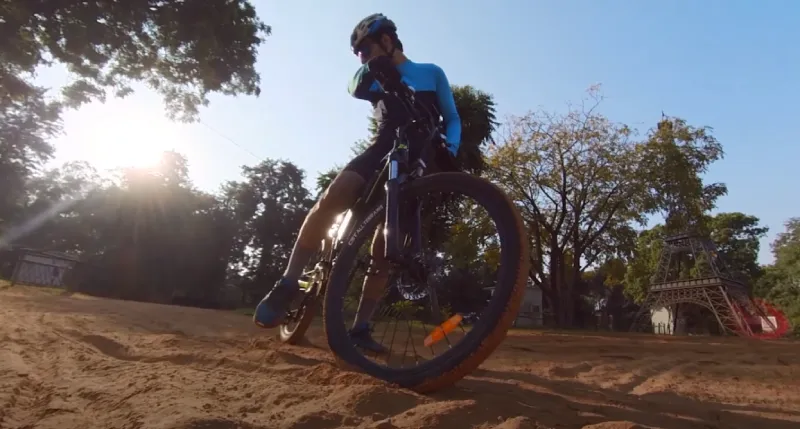
When cycling, you might feel boiling and tired, which could be because of exercise-related heat exhaustion. This condition differs from having a fever. Let’s explore heat exhaustion and how it differs from a fever.
Definition of Heat Exhaustion
A person gets heat exhaustion from physical activity, like cycling, when their body gets too hot. It occurs because your body can’t cool itself down fast enough. Here’s what you need to know:
- Overheating: Your body generates a lot of heat during exercise. If you don’t cool down properly, this heat can build up.
Symptoms of Heat Exhaustion
Recognizing the symptoms of heat exhaustion can help you take action quickly. Look out for these signs:
- Dizziness or Fainting: Feeling lightheaded or fainting can be a serious sign.
- Cool, Clammy Skin: Your skin might feel cool and damp despite overheating.
- Headache: A throbbing headache can occur.
How Heat Exhaustion Differs from Fever?
Understanding the difference between heat exhaustion and fever is important:
- Cause: Heat exhaustion is caused by external heat and physical activity, while a fever is usually caused by an infection inside the body.
- Temperature Regulation: In heat exhaustion, your body struggles to cool down from external heat, whereas in a fever, it raises the temperature to fight infection.
Brain Temperature Homeostasis
When cycling, you might feel your head getting hot even if you don’t have a fever. This can be due to how your brain manages its temperature. Let’s explore how intense exercise affects brain temperature regulation.
Brain Temperature and Intense Exercise
Your brain works hard to keep its temperature stable. But during intense exercise, like cycling, this balance can be challenged. Here’s how:
- Blood Flow: Exercise increases blood flow to your brain and muscles, raising your body temperature.
- Heat Production: When you cycle hard, muscle tissue produces heat, some traveling to your brain.
- Limited Cooling: The brain cannot cool itself directly, relying on the body’s overall cooling system (like sweating).
- Blood Vessels: Blood vessels in your head expand to release heat, warming your head.
Cycle With A Hot Head But No Fever: Prevention
If you want to avoid feeling hot while cycling without a fever, it’s important to take some preventive measures and treatments. Here are some key tips:
Hydration
Staying hydrated is crucial for managing your body temperature while cycling.
- Drink Regularly: Sip water throughout your ride, not just when you’re thirsty.
- Electrolyte Drinks: Use drinks with electrolytes to replace lost salts and minerals.
- Pre-Hydrate and Rehydrate: Drink plenty of water before and after your ride.
Appropriate Clothing
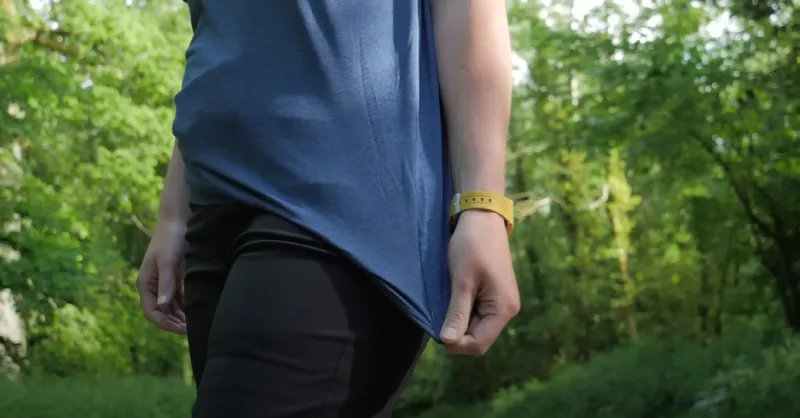
You can make a big difference by choosing the right gear when cycling in hot weather.
- Breathable Fabrics: Wear light, breathable fabrics that allow sweat to evaporate.
- Light Colors: Opt for light-colored clothing to reflect sunlight and keep cool.
- Protective Gear: Use a ventilated helmet and moisture-wicking headbands.
Pacing and Rest
Managing how hard you cycle and taking breaks can help you stay cool.
- Pace Yourself: Don’t push too hard, especially in hot weather. Slow down if you start feeling too hot.
- Take Breaks: Stop in shady or cool areas to rest and lower your body temperature.
- Cycle During Cooler Times: Try to cycle during cooler parts of the day, like early morning or late evening.
Medical Consultation
Getting medical attention is important if you continue to feel hot or notice other symptoms.
- Persistent Sensation: If the feeling of heat doesn’t go away, talk to a doctor.
- Other Symptoms: Seek medical help if you have dizziness, nausea, confusion, and heat sensation.
- Professional Advice: A healthcare professional can check for underlying issues and suggest treatments.
Conclusion
It is common to feel excessively hot in the head without a fever during intense cycling. This sensation can result from various factors, including environmental conditions, your body’s response to vigorous activity, dehydration, and age-related changes in temperature regulation.
Remember, prevention is crucial. Maintaining hydration, dressing appropriately, and pacing your efforts can help alleviate the heat. If the sensation persists or if other symptoms occur, consult a healthcare professional. Stay composed, keep pedaling, and with the right precautions, you’ve got this under control.
FAQs
How Should The Body Temperature Be During A Cycle?
During the initial phase of your cycle, body temperature is lower, increasing post-ovulation. Typically, individuals experience a temperature range of 96°–98°F before ovulation. Following ovulation, it elevates to around 97°–99°F, approximately 0.4 degrees higher than the normal temperature level.

